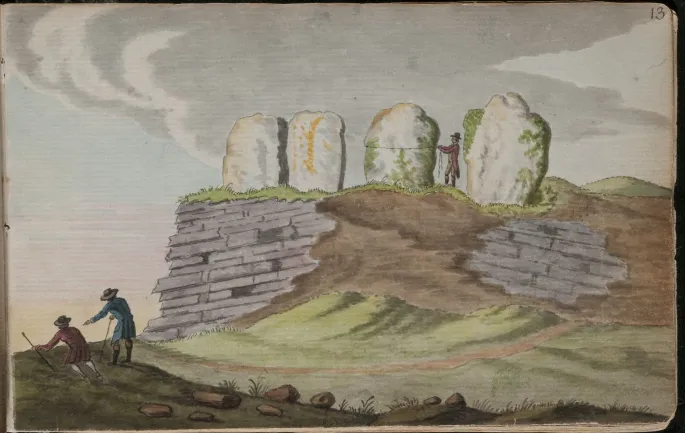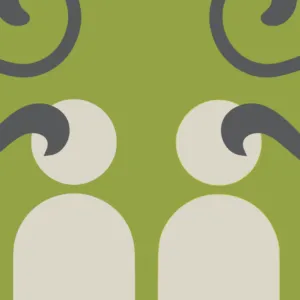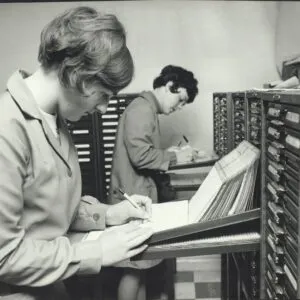The second event in the DRI's three-part webinar series on using digital archives for academic research takes place on 23 March.
Date: 23 March 2021
Time: 3:00 pm-4:30 pm
Location: Zoom Webinar
Registration: https://us02web.zoom.us/webinar/register/WN_8BIkpF9rTqqak7BRAo_W_w
Access to brick-and-mortar archives has been limited due to COVID-19 restrictions, creating challenges for humanities researchers that rely on archival materials for their research. DRI is therefore hosting a three-part public lecture series on using digital archives for academic research showcasing the rich research resources contained in digital archival collections.
The second event in the series, ‘Using Digital Archives for Geographical and Archaeological Research’, will take place on Tuesday 23 March at 3:00-4:30 pm. Although the series is aimed primarily at early career researchers, the events are open to the public and all are welcome.
Featured digital collections include:
- Gabriel Beranger’s ‘Rambles through the County of Dublin and some of the neighbouring ones’ (RIA MS 3 C 32) and ‘Rambles thro’ the County of Dublin and some others in Ireland’, MS 3 C 31: These two albums of watercolours provide illustrations of scenery and ancient monuments, general views, and details of castles and churches in Ireland. The watercolours are copies of originals (since lost) painted on expeditions undertaken by artist Gabriel Beranger, ca. 1729–1817.
- Transport Infrastructure Ireland (TII) Digital Collections: The TII Digital Heritage Collections (with ca. 2,800 records) provide access to data and results arising from the archaeological and heritage work undertaken by TII over the past twenty years in the planning, development and construction of national road and light rail projects.
- Irish Historic Towns Atlas (IHTA) Online: IHTA Online forms part of IHTA Digital and has the first 28 IHTAs available to search freely online as downloadable pdfs. They are grouped thematically by town origin (e.g., monastic, Viking, Anglo-Norman, early modern, Gaelic and plantation, eighteenth-century and nineteenth-century towns).
Speakers include:
- Barbara McCormack, Librarian at the Royal Irish Academy: Barbara the Royal Irish Academy Librarian where she has responsibility for the curation, management, and development of the Academy’s archival, manuscript, print and art collections. She was previously the Special Collections Librarian at Maynooth University Library where she had responsibility for the historic Russell Library. Barbara has experience in a wide range of public and private institutions including: The British Library, Trinity College Library, the Irish Taxation Institute, and Fáilte Ireland. She has undertaken further study with the London Rare Books School completing modules in European bookbinding, the book in the ancient world, medieval books, and letterpress printing.
- Rónán Swan, Head of Archaeology and Heritage at Transport Infrastructure Ireland (TII): Rónán is currently Head of Archaeology and Heritage with TII, previously with the National Roads Authority (NRA) and Westmeath Council. He has nearly thirty years of archaeological and management experience in both the private and public sectors. In 2017, he was elected a Director for Discovery Programme. From 2014 to 2018, he chaired the Royal Irish Academy’s Standing Committee for Archaeology. He has Post graduate Diplomas in Leadership from UCC/IMI, and Project Management from TCD, with a Masters in Archaeological Computing from the University of Southampton. He received his BA for Archaeology and Geography from UCD.
- Jennifer Moore, Editorial Assistant at Irish Historic Towns Atlas (IHTA): Jennifer has worked with the Irish Historic Towns Atlas (IHTA) since 2006 as an editorial assistant and researcher. She has been involved in producing IHTA Online and educational and public outreach for the project. She served as a member on the National Archives Advisory Council from 2011 to 2016 and while studying print culture and urban history at the University of Limerick, she tutored and lectured in historiography, Irish and Australian history. She published articles on Irish urban and architectural history, and print and material culture.
Registered attendees will receive a DRI Publication called 'Using Digital Archives for Academic Research'. This publication was developed to support the series and highlights additional digital archival collections that early career researchers can explore.
This event will take place over Zoom Webinar but it is not necessary to have a Zoom account to join. The webinar will be recorded and livestreamed to the DRI Facebook Page. Audience members will not be visible in the recording. The recording will be made available on the DRI website and Repository after the event.
A recording of the first webinar in the series, 'Using Digital Archives for Historical Research', is available here: https://doi.org/10.7486/DRI.r4958772q
The final webinar in the series, 'Using Digital Archives for Social Sciences Research', will take place on 20 April 2021 at 3pm. More details to follow.
Image Credit: RIA MS 3 C 32/13, Beranger, Gabriel, ca.1729-1817. View of the remains of a druidical monument at Douth [Dowth], Co[unty] of Meath, 2 miles from Slane, & 24 miles from Dublin […]. By permission of the Royal Irish Academy [Depositing Institution], Digital Repository of Ireland [Distributor], https://doi.org/10.7486/DRI.7m01r571d
DRI operates in compliance with GDPR. Please see our Privacy Statement for more information about our use of your data: https://www.dri.ie/dri-privacy-statement







